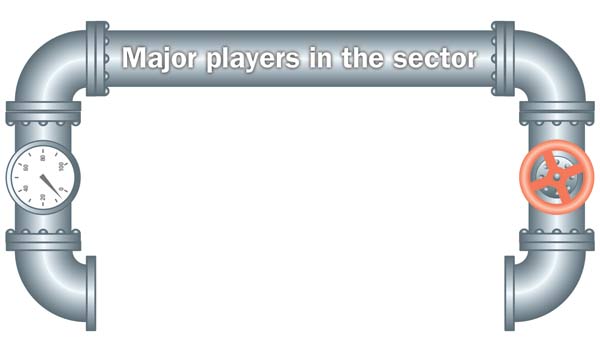The lifting of international sanctions on Iran will lead to increased opportunities for Pakistan to promote bilateral trade and investment,
The lifting of international sanctions on Iran will lead to increased opportunities for Pakistan to promote bilateral trade and investment, and to re-initiate work on the many stalled projects agreed to in the past, including Iran-Pak Refinery project.
The proposed Iran-Pak Refinery is of great significance to Pakistan in the wake of rising demand of refined petroleum products in Pakistan and inability of its existing oil refineries to meet the present and future demand. Iran-Pak Refinery project, to be constructed at Gwadar port in Balochistan at a cost of $4 billion, as a joint venture with the government of Pakistan on the basis of equal shareholding, was shelved some years ago. It was also planned as part of the project to lay an oil pipeline from Iran to Gwadar port to transport crude oil for processing at the proposed refinery.
 The project, conceived in the late 1990s, was planned to refine 80,000 barrels per day (bpd) or about 4 million tons per annum (MTPA) of the Iranian heavy crude. The fully integrated refinery project was first proposed to be established at Port Qasim, Karachi for which project implementation framework was finalised, but it could not take-off. The project was revived by the Iranian side in 2007 to be re-located at Khalifa Point in Hub, Balochistan for which 700 acres of land was also acquired, but still there was no progress seen, apparently due to many commercial issues. Nonetheless, it was in April 2011 that the project was revived once again for construction at Gwadar port, and Pakistan State Oil (PSO) was nominated to be the JV partner representing the Pakistan side.
The project, conceived in the late 1990s, was planned to refine 80,000 barrels per day (bpd) or about 4 million tons per annum (MTPA) of the Iranian heavy crude. The fully integrated refinery project was first proposed to be established at Port Qasim, Karachi for which project implementation framework was finalised, but it could not take-off. The project was revived by the Iranian side in 2007 to be re-located at Khalifa Point in Hub, Balochistan for which 700 acres of land was also acquired, but still there was no progress seen, apparently due to many commercial issues. Nonetheless, it was in April 2011 that the project was revived once again for construction at Gwadar port, and Pakistan State Oil (PSO) was nominated to be the JV partner representing the Pakistan side.
Today, Pakistan has a total refining capacity to process around 400,000bpd or about 19MTPA of crude oil, against the current demand of 24MTPA. Total global refining capacity is 97 million bpd, and Pakistan, with nominal world share of 0.4 percent, is ranked 48th. Demand for oil products in the country is expected to grow steadily at seven percent on year-on-year basis, according to recent studies, in particular for the furnace oil, motor spirit, diesel and aviation fuel, which accounts for 78 percent of total oil demand. Thus, the demand-supply gap will continue to strain heavily on the imports in future, if oil refining capacity is not added at a large scale.
Global refining capacity is expected to reach 115 million bpd by 2020 despite low crude oil prices and consequently the gloomy scenario for the oil and gas sector. It is however speculated that the global trend of declining oil prices would be arrested in the near future. Interestingly, most recent oil refining capacity additions have taken place in the Asia-Pacific region. Pakistan should therefore be no exception as future energy consumption poses a serious challenge for the nation, and refining margins are high.
Currently, there are seven oil refineries operating in the country. Major players in the sector are Pak-Arab Refinery Co Ltd (Parco) of 100,000bpd (4.5MTPA), National Refinery Ltd (NRL) of 64,000bpd (2.9MTPA), Pakistan Refinery Ltd (PRL) of 47,000bpd (2.1MTPA), Attock Refinery Ltd (ARL) of 43,000bpd (1.9MTPA), Byco Petroleum Pakistan Ltd (BPPL) of 35,000bpd (1.6MTPA) and Byco Oil Pakistan Ltd (BOPL) of 120,000bpd (5.4MTPA) output capacity, which was commissioned in June 2015.
Currently, capacity expansion project of ARL, which is totally dependent on local crude oil and condensate, by 10,400bpd (0.47 MTPA) is being implemented. Parco, which is a joint venture between the governments of Pakistan and the UAE, processes heavy crude from the UAE only. Pakistan Refinery and National Refinery also process indigenous crude, blending with crude oil imported from the Gulf and Saudi Arabian sources.
To meet fast growing demand of the POL (petroleum oils and lubricants) products it was planned by the government since long to set up new refinery projects, besides undertaking capacity expansion of the existing refineries. It was projected to achieve total capacity, in phases, up to 520,000bpd by 2014-15. The plans however were not implemented as envisaged, though the government had initiated the largest refinery project in Pakistan namely Khalifa Coastal Refinery, of capacity 250,000bpd or 13MTPA. To be installed at Hub near Gadani coastal area in Balochistan, the refinery was approved by the ECC of the Cabinet in 2007 at a cost of $6 billion, followed by signing of the project implementation agreement in Islamabad on November 13, 2007.
The project, a joint venture of Parco and International Petroleum Investment Co (IPC) of the UAE, was scheduled for commissioning in 2011. The complex would include a 250MW power plant, grid station, mini port terminal, and petrochemical city for downstream industries, road network and other infrastructure. Sadly, the project remained on hold for long and there had been no physical progress on the construction of Khalifa Refinery for which the government has provided 1,000 acres of land to the investors as free-hold lease. Perhaps, work on the project was suspended in the past due to global recession and difficult business environments of the petroleum sector. Parco revived the project in October 2009 approving initial funding of $500 million to start construction of Khalifa Refinery by December 2009. Later, the company, Khalifa Coastal Refinery Co Ltd (KCRC) was formed in March 2011 to execute the project, but it has not materialised as yet.
To optimally utilise indigenous crude oil, the Badin Refinery was planned in 1991, with a capacity of 35,000bpd extendable to 45,000bpd. The project, a joint venture of the PSO with Kuwait, was to be established at Jamshoro to meet large furnace oil requirements of a number of thermal power plants located there. Another lobby however wanted the refinery to be set up in Karachi. The project received low priority by the government, apparently on the issue of its location, and has not been developed. Indus Refinery Ltd, in private sector, of 93,000bpd capacity located near Port Qasim Karachi is another long-running project, which has not been completed as yet.
There is indeed a long list of missed opportunities in the petroleum sector. Trans-Asia Refinery project was planned of 100,000bpd capacity at Port Qasim, Karachi. Also, Kuwait and Saudi Arabia had shown interest to set up refineries of 200,000bpd at Port Qasim and 300,000bpd capacity at Hub, respectively. Likewise, China wanted to construct a refinery and petrochemical complex at Gwadar port. There has been no progress on any of these projects. But in a latest development, China and the UAE investors have shown interest in setting up oil refineries in Pakistan. Also, the first refinery to be established in Khyber Pakhtunkhwa is on cards based on indigenous crude oil, of initial capacity 20,000bpd to be doubled in the next phase. A multinational company has recently conducted study for selection of a suitable site for the refinery between Kohat and Karak where oil wells are located. The nation keenly looks towards further progress in this direction.
The writer is former Chairman of the State Engineering Corporation